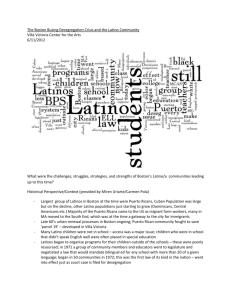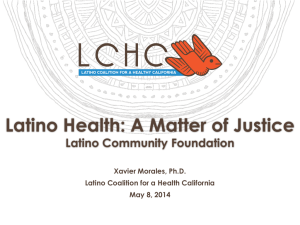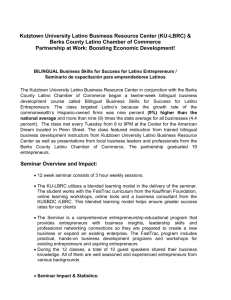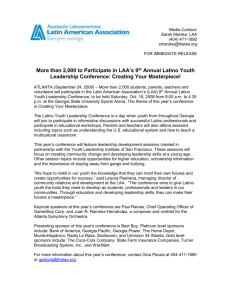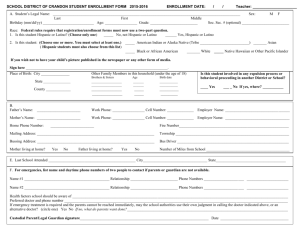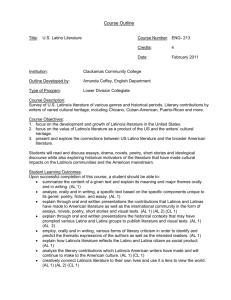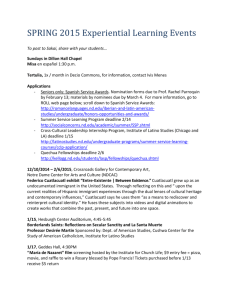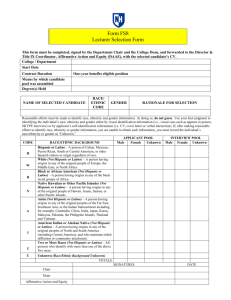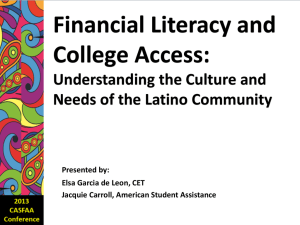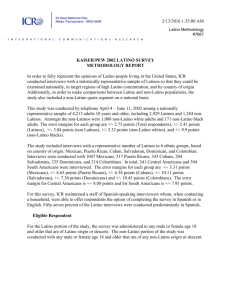COUN 5XX - Seminar in Clinical Intervention
advertisement
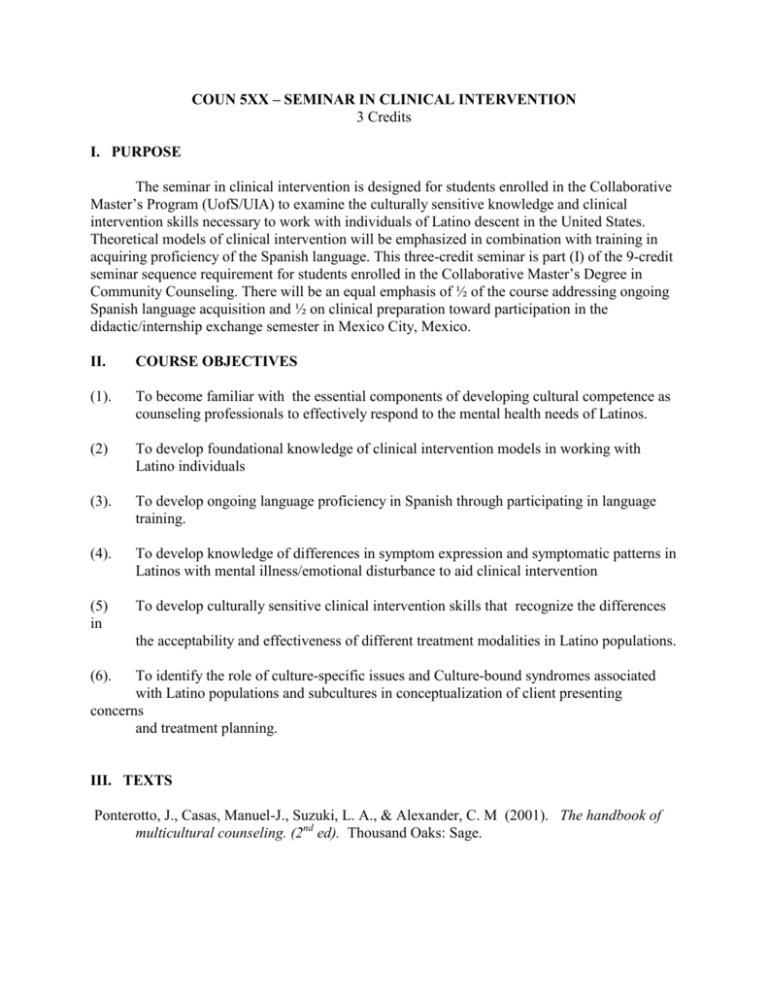
COUN 5XX – SEMINAR IN CLINICAL INTERVENTION 3 Credits I. PURPOSE The seminar in clinical intervention is designed for students enrolled in the Collaborative Master’s Program (UofS/UIA) to examine the culturally sensitive knowledge and clinical intervention skills necessary to work with individuals of Latino descent in the United States. Theoretical models of clinical intervention will be emphasized in combination with training in acquiring proficiency of the Spanish language. This three-credit seminar is part (I) of the 9-credit seminar sequence requirement for students enrolled in the Collaborative Master’s Degree in Community Counseling. There will be an equal emphasis of ½ of the course addressing ongoing Spanish language acquisition and ½ on clinical preparation toward participation in the didactic/internship exchange semester in Mexico City, Mexico. II. COURSE OBJECTIVES (1). To become familiar with the essential components of developing cultural competence as counseling professionals to effectively respond to the mental health needs of Latinos. (2) To develop foundational knowledge of clinical intervention models in working with Latino individuals (3). To develop ongoing language proficiency in Spanish through participating in language training. (4). To develop knowledge of differences in symptom expression and symptomatic patterns in Latinos with mental illness/emotional disturbance to aid clinical intervention (5) in To develop culturally sensitive clinical intervention skills that recognize the differences the acceptability and effectiveness of different treatment modalities in Latino populations. (6). To identify the role of culture-specific issues and Culture-bound syndromes associated with Latino populations and subcultures in conceptualization of client presenting concerns and treatment planning. III. TEXTS Ponterotto, J., Casas, Manuel-J., Suzuki, L. A., & Alexander, C. M (2001). The handbook of multicultural counseling. (2nd ed). Thousand Oaks: Sage. IV. PROCEDURES The instructional methods to be employed for Part I of this course (seminar in clinical intervention) will be a combination of lecture, discussion, small group work, field placement, discussion, small group supervision, guest speakers, and the development of clinical intervention programs for specific issues within the Latino community. These methods are complementary to attendance and careful reading of the required texts. The instructional methods to be employed for Part II of this course (Spanish language training) will be participation in level-specific language coursework. Students will be expected to develop ongoing proficiency in Spanish to adhere to the language competency guidelines for providers established by to serve the mental health needs of monolingual and bilingual Latino consumers V. ASSIGNMENTS/EVALUATION 1. Students will participate in clinical activities (i.e., counseling, clinical assessment, case conceptualizations and clinical intervention planning) over the course of the semester at an advanced level. 2. Clinical Intervention Self-Assessment: As a way of assessing present counseling skills students will be required to write a summary of present relevant skills prior to beginning this seminar. This pre-assessment summary should include clinical background (strengths and weaknesses), an overview of your model of counseling, your experiences in clinical intervention development, clinical assessment, and incorporation of sensitivity to Latino issues in counseling. 3. Clinical Intervention Program Development. You will do a literature review on the pertinent issues in counseling Latinos and its implications on developing clinical intervention programs. The following areas from provider competencies may be utilized to examine culture-specific issues facing the Latino communities. Conduct ethnographic interviews; Communicate and listen effectively across cultures Assess Latino consumers with an understanding of cultural differences in psychopathology. Ability to avoid under-diagnosis, misdiagnosis or overdiagnosis. Formulate culturally competent treatment plans that are appropriate for the client and the family’s concept of mental illness; Create multidimensional treatment plans which include culture, family and community; 2 Utilize culturally appropriate community resources (i.e. family, church, community members and other groups). Know when to recommend culturally factored psychological assessment and testing procedures for Latino consumers and when not to use tests which are biased towards Latino consumers Write a paper developing a specific community intervention program proposal, which you will present to an identified local community agency providing services to the Latino population. 4. Class Participation: Students are expected to have read the assigned materials and to come to the seminar prepared to discuss them. 3


